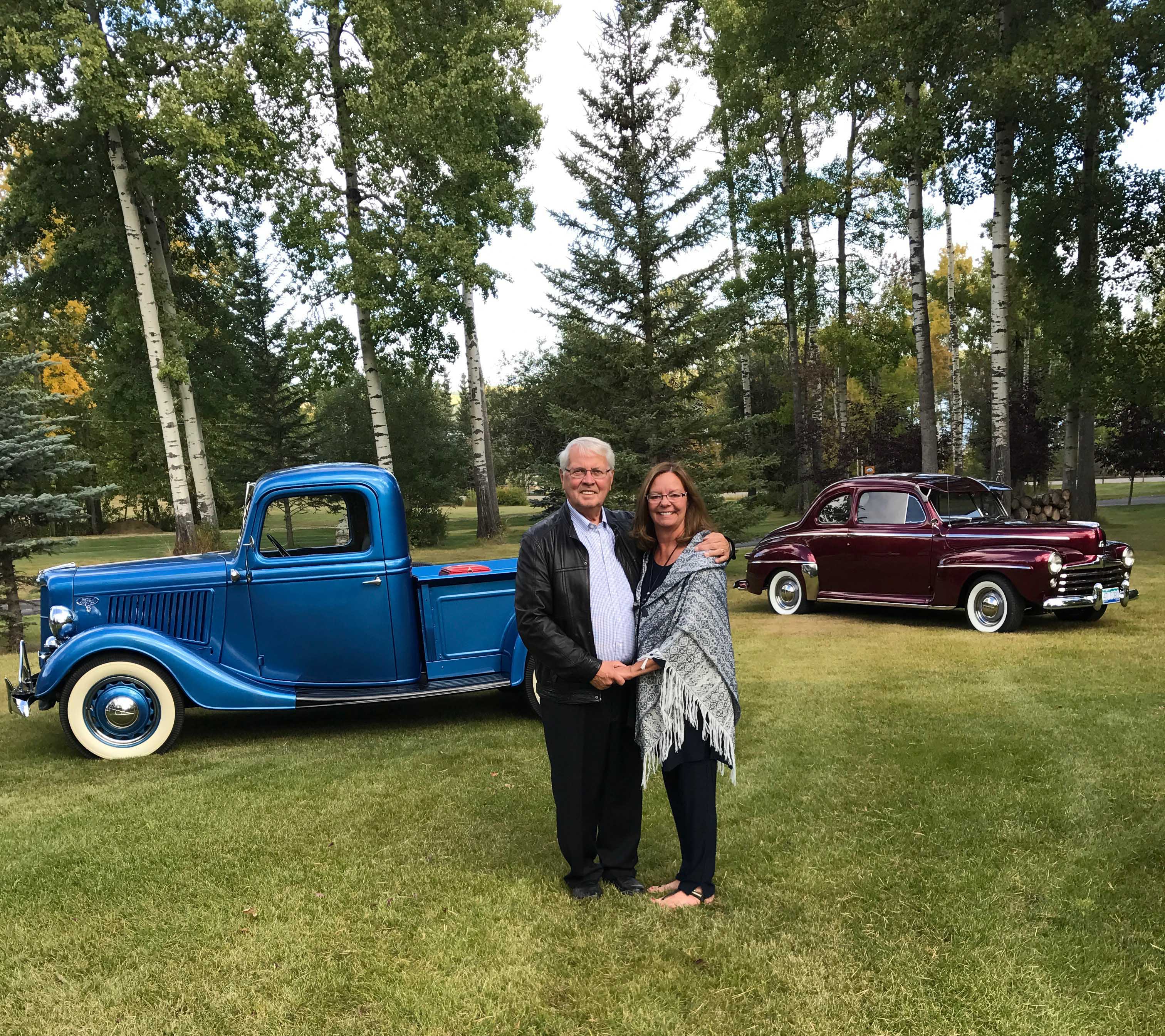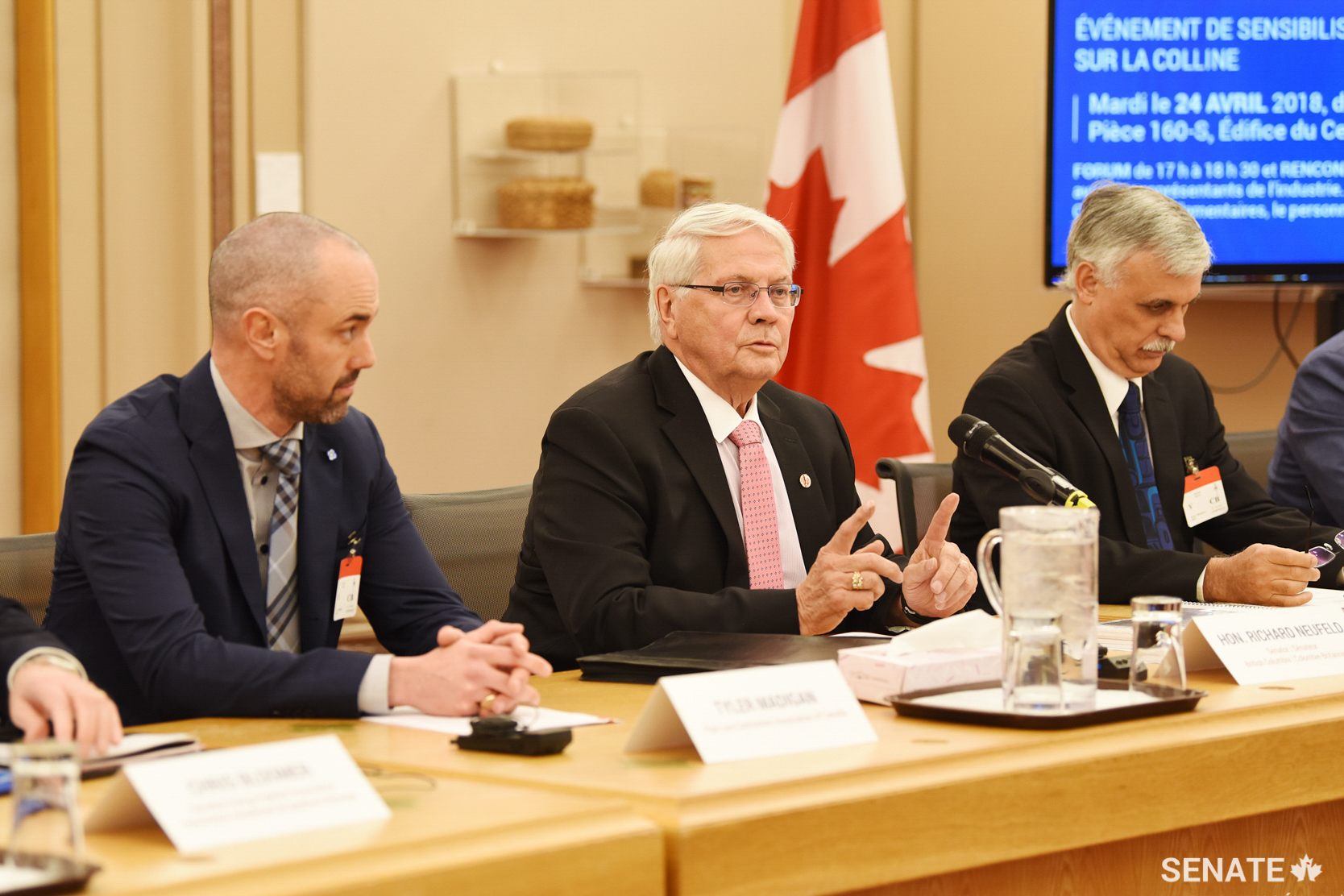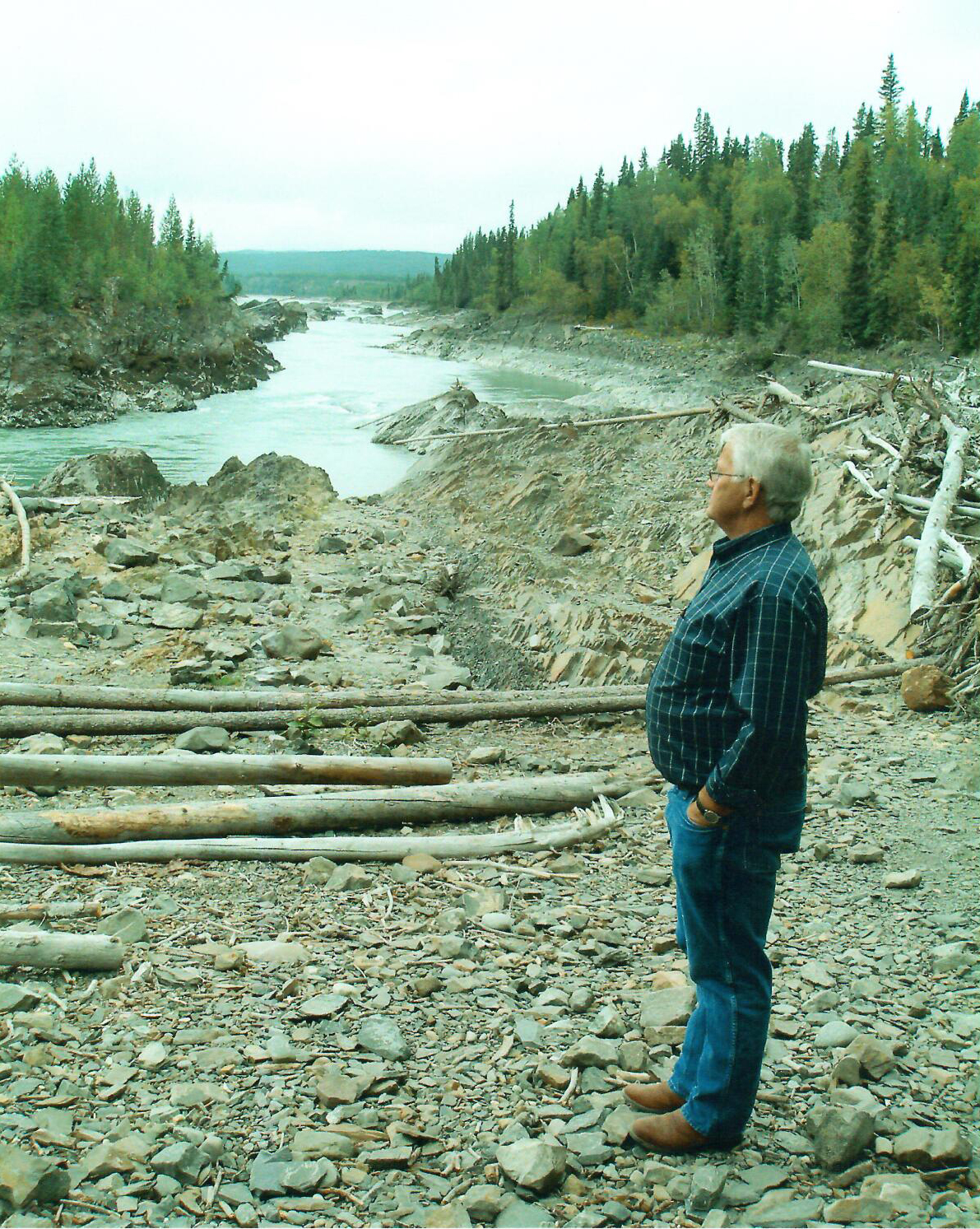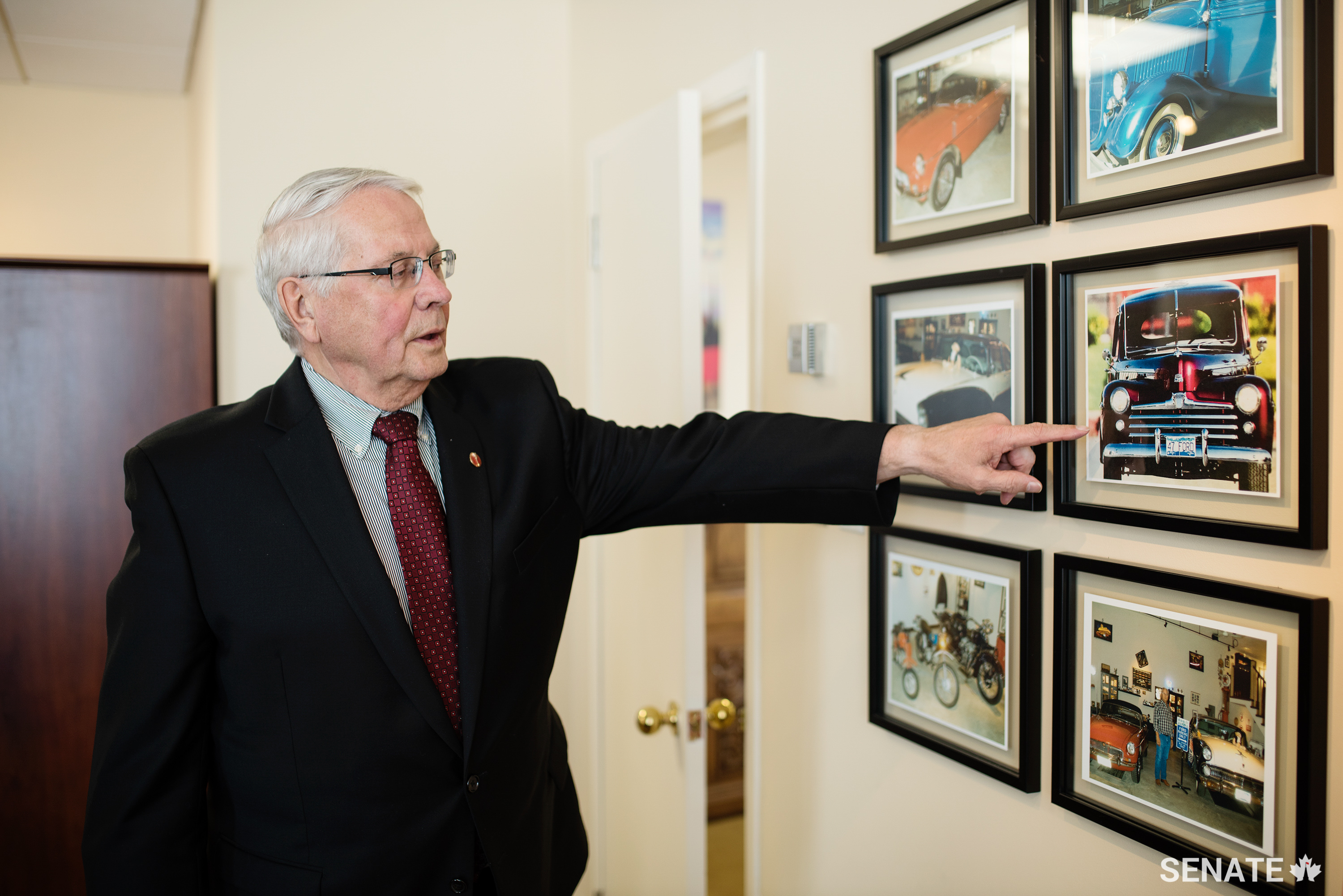Meet Senator Richard Neufeld

Senator Richard Neufeld has represented the people of British Columbia and Canada for four decades, serving four terms as MLA for the B.C. riding of Peace River North, including eight years as Minister of Energy, Mines and Petroleum Resources. He was also a councillor and mayor of Fort Nelson, B.C.
Appointed to the Senate in 2009, he is a member of Senate committees on Energy, the Environment and Natural Resources, National Finance and Arctic.


Tell us something about yourself that Canadians might not know about you.
I was adopted. My parents, they weren’t able to have children. In 1940, they went in this big orphanage in Lethbridge in Alberta and there were babies all over the place. They just walked around and said, “We’ll take that one,” pointing to my older sister.
That’s exactly the same way they got me. Four years later, my parents and my sister went to the same place. My sister always reminded me: “I picked you because you were smiling, lying in your crib.” It was quite neat. And my mom and dad said, “We’ll take him,” and away I went. That’s how it was done in those days.
My sister wrote me a note on my 65th birthday and I have it hanging up at home. She wrote about that day: “You were smiling, but I’m sure it was gas.”
What do you think are the biggest public policy issues facing Canada today?
I think it’s about economics. It’s about jobs. The main industry in the town I live in is oil and gas. In northeast British Columbia, it’s the major industry. Forestry is also huge and so is agriculture. Those three industries will evolve over time but they are industries that, as far as I’m concerned, we all need and rely on heavily, but there seem to be different opinions depending on where you are in Canada.
When I’m in the East, a lot of people say, “get rid of the oil and gas industry.” They say things will go electric. I don’t disagree with that to a degree. You can drive a car with electricity, but you can’t build it with electricity. You need products like natural gas and oil for the plastic, the steel, for the copper, for all of those kinds of things. People tend to simplify it. We won’t see the end of the oil and gas industry in my lifetime. There are thousands of products that we use, like the clothes that you’re wearing, that depend on oil. There are so many things that we can’t even count them anymore. No one yet has figured out what they’re going to replace that with.
Why should more Canadians care about what happens in the Senate?
It’s part of our parliamentary system. It’s an integral part of the government. It’s where senators review legislation and budgets to see if there are things that may affect different parts of the country negatively and try to bring those things to light and try to make them better. We should use the knowledge from everyone to try to make the best decisions to move forward.
You have work to do. It’s long days, it’s long hours and I would say that senators are working hard to make the system work, and I think it would be good for Canadians to understand a little bit more about what goes on.
Also, it’s not nearly as partisan as the House of Commons and it shouldn’t be. I chaired a committee for four or five years and I must admit that senators on the committee worked very well together and on consensus-basis.
What is a hidden gem in your region that more Canadians need to know about?
The Alaska Highway — I always refer to it as a non-commercialized version of Banff and Jasper. It was built during the Second World War by American and Canadian service people to protect against a Japanese invasion into Alaska. There are miles and miles of untouched, beautiful water, rivers, lakes, and forests. It’s beautiful to see. You don’t see many Canadians going up there, but you see a lot of Americans. The summer is just full of American licence plates because they’re going to see their last frontier. It is a jewel.
There are pristine lakes right alongside the highway. You have to marvel a bit about how it was built at that time. It was truly an impressive feat in engineering — some 2,300 kilometres in eight months or so through wilderness and mountain ranges.
Name a guilty pleasure song that always makes you smile and why.
I’m a country and western fan. “Humble and Kind” by Tim McGraw. It talks about family, it talks about being kind to people. Being humble and kind certainly gets you through life a lot better than being miserable. I listen to some other music, too. I love Céline Dion, I love her singing. I also, because of my age — I’m 74 — always go back to Elvis Presley. When I was a young guy, I listened to Elvis Presley. He still holds a lot of records that no one else has broken.


What do you do to relax?
I have fun going out and taking a car apart, or a tractor, and getting dirty and greasy. My dad was a mechanic, so I have some mechanic experience on older stuff. Not on newer stuff — you need computers for that. Some people read books, but I like to go to my shop that’s all hooked up for sound and everything and you can watch TV in there. Tinker with this, tinker with that. That’s what I find relaxing. Or, even mowing my grass.
My wife and I have four vintage cars at home. A 1936 Ford Half-Ton, a 1947 Ford Coupe, a 1955 Ford Crown Victoria and a 1965 MGB. My wife and I made a trip to California and back in our MGB, which averaged 38 miles per gallon. Today, they’re having a hard time getting that efficiency with the newer cars.
Why are you proud to be Canadian?
It’s my home. I think there are so many things that we can be thankful for. If I get sick, if I have heart problems, I know I can go to almost any hospital across Canada and get looked after. They don’t ask me for my credit card first, they take you in and actually look after you. And my kids have access to that kind of health care. Unfortunately, the same services are not always offered in smaller or remote communities because there’s always a doctor shortage.
There are so many things to be proud of in Canada. Our democracy, we vote, you have a say — all of those things. And I know there are lots of other countries that have the same thing, but to me this is special. This is where I was born and we’ll never call any other place home. When you leave home and travel abroad, you think a little bit more about it and how lucky we truly are to live in such an outstanding country.
Note to readers: The Honourable Richard Neufeld retired from the Senate of Canada in November 2019. Learn more about his work in Parliament.
Related articles
Tags
Committee news
Meet Senator Richard Neufeld

Senator Richard Neufeld has represented the people of British Columbia and Canada for four decades, serving four terms as MLA for the B.C. riding of Peace River North, including eight years as Minister of Energy, Mines and Petroleum Resources. He was also a councillor and mayor of Fort Nelson, B.C.
Appointed to the Senate in 2009, he is a member of Senate committees on Energy, the Environment and Natural Resources, National Finance and Arctic.


Tell us something about yourself that Canadians might not know about you.
I was adopted. My parents, they weren’t able to have children. In 1940, they went in this big orphanage in Lethbridge in Alberta and there were babies all over the place. They just walked around and said, “We’ll take that one,” pointing to my older sister.
That’s exactly the same way they got me. Four years later, my parents and my sister went to the same place. My sister always reminded me: “I picked you because you were smiling, lying in your crib.” It was quite neat. And my mom and dad said, “We’ll take him,” and away I went. That’s how it was done in those days.
My sister wrote me a note on my 65th birthday and I have it hanging up at home. She wrote about that day: “You were smiling, but I’m sure it was gas.”
What do you think are the biggest public policy issues facing Canada today?
I think it’s about economics. It’s about jobs. The main industry in the town I live in is oil and gas. In northeast British Columbia, it’s the major industry. Forestry is also huge and so is agriculture. Those three industries will evolve over time but they are industries that, as far as I’m concerned, we all need and rely on heavily, but there seem to be different opinions depending on where you are in Canada.
When I’m in the East, a lot of people say, “get rid of the oil and gas industry.” They say things will go electric. I don’t disagree with that to a degree. You can drive a car with electricity, but you can’t build it with electricity. You need products like natural gas and oil for the plastic, the steel, for the copper, for all of those kinds of things. People tend to simplify it. We won’t see the end of the oil and gas industry in my lifetime. There are thousands of products that we use, like the clothes that you’re wearing, that depend on oil. There are so many things that we can’t even count them anymore. No one yet has figured out what they’re going to replace that with.
Why should more Canadians care about what happens in the Senate?
It’s part of our parliamentary system. It’s an integral part of the government. It’s where senators review legislation and budgets to see if there are things that may affect different parts of the country negatively and try to bring those things to light and try to make them better. We should use the knowledge from everyone to try to make the best decisions to move forward.
You have work to do. It’s long days, it’s long hours and I would say that senators are working hard to make the system work, and I think it would be good for Canadians to understand a little bit more about what goes on.
Also, it’s not nearly as partisan as the House of Commons and it shouldn’t be. I chaired a committee for four or five years and I must admit that senators on the committee worked very well together and on consensus-basis.
What is a hidden gem in your region that more Canadians need to know about?
The Alaska Highway — I always refer to it as a non-commercialized version of Banff and Jasper. It was built during the Second World War by American and Canadian service people to protect against a Japanese invasion into Alaska. There are miles and miles of untouched, beautiful water, rivers, lakes, and forests. It’s beautiful to see. You don’t see many Canadians going up there, but you see a lot of Americans. The summer is just full of American licence plates because they’re going to see their last frontier. It is a jewel.
There are pristine lakes right alongside the highway. You have to marvel a bit about how it was built at that time. It was truly an impressive feat in engineering — some 2,300 kilometres in eight months or so through wilderness and mountain ranges.
Name a guilty pleasure song that always makes you smile and why.
I’m a country and western fan. “Humble and Kind” by Tim McGraw. It talks about family, it talks about being kind to people. Being humble and kind certainly gets you through life a lot better than being miserable. I listen to some other music, too. I love Céline Dion, I love her singing. I also, because of my age — I’m 74 — always go back to Elvis Presley. When I was a young guy, I listened to Elvis Presley. He still holds a lot of records that no one else has broken.


What do you do to relax?
I have fun going out and taking a car apart, or a tractor, and getting dirty and greasy. My dad was a mechanic, so I have some mechanic experience on older stuff. Not on newer stuff — you need computers for that. Some people read books, but I like to go to my shop that’s all hooked up for sound and everything and you can watch TV in there. Tinker with this, tinker with that. That’s what I find relaxing. Or, even mowing my grass.
My wife and I have four vintage cars at home. A 1936 Ford Half-Ton, a 1947 Ford Coupe, a 1955 Ford Crown Victoria and a 1965 MGB. My wife and I made a trip to California and back in our MGB, which averaged 38 miles per gallon. Today, they’re having a hard time getting that efficiency with the newer cars.
Why are you proud to be Canadian?
It’s my home. I think there are so many things that we can be thankful for. If I get sick, if I have heart problems, I know I can go to almost any hospital across Canada and get looked after. They don’t ask me for my credit card first, they take you in and actually look after you. And my kids have access to that kind of health care. Unfortunately, the same services are not always offered in smaller or remote communities because there’s always a doctor shortage.
There are so many things to be proud of in Canada. Our democracy, we vote, you have a say — all of those things. And I know there are lots of other countries that have the same thing, but to me this is special. This is where I was born and we’ll never call any other place home. When you leave home and travel abroad, you think a little bit more about it and how lucky we truly are to live in such an outstanding country.
Note to readers: The Honourable Richard Neufeld retired from the Senate of Canada in November 2019. Learn more about his work in Parliament.


